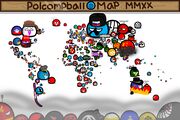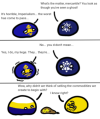imported>MonkeJoe m (→Friends) |
imported>Huguzizd No edit summary |
||
| Line 14: | Line 14: | ||
[[File:Regulationism.png]] [[Regulationism]] | [[File:Regulationism.png]] [[Regulationism]] | ||
|alignments = | |alignments = | ||
[[File:Authright.png]] [[:Category:AuthRight|AuthRight]] ( | [[File:Rightunity-yellow.png]] [[:Category:Right Unity|RightUnity]] (usually)<br> | ||
[[File:Authright.png]] [[:Category:AuthRight|AuthRight]] (some) | |||
|aliases = Proto-Capitalism<br>Merchant Capitalism<br>Ultra-Protectionism<br>Right-Protectionism | |aliases = Proto-Capitalism<br>Merchant Capitalism<br>Ultra-Protectionism<br>Right-Protectionism | ||
|song = [https://www.youtube.com/watch?v=BxmB2DB10Ts Mercantilism Rap] | |song = [https://www.youtube.com/watch?v=BxmB2DB10Ts Mercantilism Rap] | ||
Revision as of 06:05, 28 November 2022
Mercantilism is an economic policy located (debatably) on the far right of the economic axis that strives to increase the exports of a nation but decrease the imports to it. It is usually authoritarian-leaning, as well, since it is an ideology that believes that the state should be the primary recipient of wealth (much like ![]() State Capitalism).
State Capitalism).
Traditionally, mercantilists believed that gold ownership was the main indication of wealth; and gold is NOT manufactured, but rather exists in a finite supply on Earth and is simply divided amongst the nations that have it. The Great Steve Heimler from Heimler's History compared the way mercantilists saw gold to the way hungry people see a pie: There is only one pie, and everyone is trying to get as much as they can!
He emerged out of ![]() Feudalism and was the precursor of
Feudalism and was the precursor of ![]() Capitalism, although they both see wealth as radically different things.
Capitalism, although they both see wealth as radically different things.
Mercantilism is based on the core assumption that wealth exists in the form of precious metals and is simply distributed, thus it's based on the amount of gold/silver a country had, and that the state/nation should focus on enriching themselves first. Since it believed that the real riches of a nation was a byproduct of the amount of gold and other precious metals that it had, it led to colonialism having a big focus on finding gold and silver mining places, since that would undermine the capacity of other powers to enrich themselves.
And due to seeing wealth as a zero-sum game, it also believes that increasing the national trade surplus will make the nation richer while making the other nations (its rivals and enemies) poorer.
As stated before, Mercantilism and ![]() Capitalism see the nature of wealth as completely different. While Capitalism sees wealth as the goods and services produced and consumed, and sees gold simply as a mean of exchange to obtain these goods; Mercantilism sees gold as the goal, not as a mean to an end.
Capitalism see the nature of wealth as completely different. While Capitalism sees wealth as the goods and services produced and consumed, and sees gold simply as a mean of exchange to obtain these goods; Mercantilism sees gold as the goal, not as a mean to an end.
Which also lead to the core difference (in practice), which is trading policy.
While ![]() Capitalism sees free trade as a way to increase the nation's wealth, since it lets the nation specialize in what it can do better while letting what it can't do to be handled by others and thus generate more wealth, Mercantilism sees free trade as something that weakens the nation by allowing its rivals (and trading partners in this situation) to stockpile more wealth which could've been kept by the nation, making it poorer.
Capitalism sees free trade as a way to increase the nation's wealth, since it lets the nation specialize in what it can do better while letting what it can't do to be handled by others and thus generate more wealth, Mercantilism sees free trade as something that weakens the nation by allowing its rivals (and trading partners in this situation) to stockpile more wealth which could've been kept by the nation, making it poorer.
This resulted in policies that sought to maximise the types of goods produced within the country and minimising things that needed to be imported, as well as the nation's exports, usually translating into policies such as restricting the nations colonies could trade with, if at all. Mercantilism was also generally in support of a strong merchant class, seeing them as on par with the nobility.
Mercantilism in the modern days
Mercantilism is a very old ideology, which stopped being relevant more than 3 centuries ago; but Mercantilist mentality (which isn't the same as ![]() Protectionist mentality) can be seen in modern economic policy. The biggest example is US trading policy under the
Protectionist mentality) can be seen in modern economic policy. The biggest example is US trading policy under the ![]() Trump administration.
Trump administration.
Trump argued that the U.S. "loses" money spent in importing foreign goods and materials, and that a "strong economy" must run a trade surplus. Furthermore, the rhetoric of the president often suggests that any money spent on imports enriches foreign competitors at the expense of American businesses and workers.
Personality
Mercantilism acts as a stereotypical European Merchant, Banker, Sailor and/or Noble investor in the 16th to 18th centuries.
How to Draw

- Draw a ball.
- Fill in with blue.
- Draw a yellow ship on waves.
- Draw in the eyes.
You're done!
Relationships
Friends
 Dengism - He's still angry at me for the opium trade but he's a good student.
Dengism - He's still angry at me for the opium trade but he's a good student. Roman Republicanism - He taught me what I know about business.
Roman Republicanism - He taught me what I know about business. Protectionism - Remember son, exports good imports bad!
Protectionism - Remember son, exports good imports bad! Cameralism - Yeah! Wealth to the state!
Cameralism - Yeah! Wealth to the state! Imperialism - Good business partner.
Imperialism - Good business partner. Reactionary Socialism - The only left-wing ideology that gets it.
Reactionary Socialism - The only left-wing ideology that gets it.
Frenemies
 Capitalism - Allowed the merchant class to become richer, but free trade, really?
Capitalism - Allowed the merchant class to become richer, but free trade, really? State Capitalism - Our merchant republics aren't exactly "state capitalist" but you know our ways.
State Capitalism - Our merchant republics aren't exactly "state capitalist" but you know our ways. Guild Socialism - We always keep in contact with the merchants guild.
Guild Socialism - We always keep in contact with the merchants guild. Hydrarchy - He might be a dense bloke but his privateers are useful.
Hydrarchy - He might be a dense bloke but his privateers are useful. Juche - My commie student. His heart is in the right place.
Juche - My commie student. His heart is in the right place.
Enemies
 Hayekism - LMAO how am I the communist when you claim to want to enrich the common people?
Hayekism - LMAO how am I the communist when you claim to want to enrich the common people? Libertarianism - Okay you like capitalism, but your "unrestricted international trade" policy is disgusting!
Libertarianism - Okay you like capitalism, but your "unrestricted international trade" policy is disgusting! Neoliberalism - Exports good imports bad! Don't break the rules moron!
Neoliberalism - Exports good imports bad! Don't break the rules moron! Anarchism - How can the state be enriched when there is no state!
Anarchism - How can the state be enriched when there is no state! Classical Liberalism - Free Trade? More like Downgrade! XD
Classical Liberalism - Free Trade? More like Downgrade! XD Liberalism - You're even dumber than your dad! LMAO!
Liberalism - You're even dumber than your dad! LMAO!
Further Information
Wikipedia
Videos
Online Communities
Gallery
-
-
-
Credit: OzymandiasFR, Mercantilism can be seen at the bottom with all the "Dead" ideologies.
-
Credit: u/beancakeinatree, Source
-
u/K-Tech2 Source
-
Alt design
Animations
Mercantilism is one of the main characters in the online video series Voyage by Galileo.




